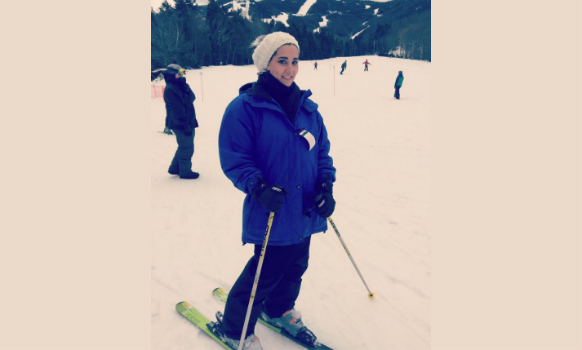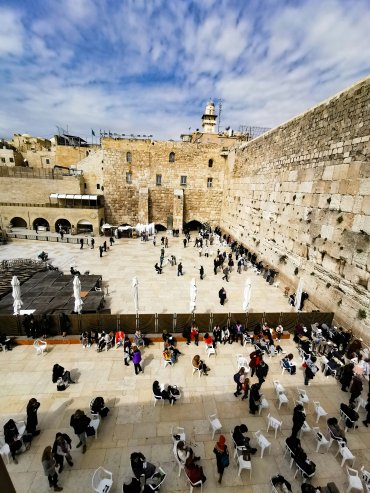
Hallel On Seder Night Is Different From All Other Hallels
Kadesh, urchatz, karpas…tzafun, barech, Hallel, nirtzah.
Kiddush, washing, karpas…afikomen, grace after meals, Hallel…
Many of us have been singing the steps of the seder for as long as we can remember – which is great if we want to remember what to do, but not so great if we want to think about why we do it. Familiarity breeds… familiarity. We don’t notice or question what we’re used to; it’s the oddities, the things we haven’t seen before, that catch our attention and make us ask why this night is different from all other nights.
If we weren’t so used to the steps of the seder being what they are, we might think to add a few to that rehearsed litany of four questions. For instance, we might ask: What’s Hallel, always a daytime prayer, doing in the nighttime Pesach Seder?
In other words, we might ask: Why is this night different from all other days?
In fact, the Talmud (Megillah 20b) seems to state clearly that Hallel belongs solely to the daytime, based on verses (recited as part of Hallel) that specify praising God during the day. The Talmudic lists of occasions on which Hallel is recited highlight the anomalous nature of seder night: “On 18 days in the year and one night, we recite Hallel” (Tosefta Sukkah 3:2); other lists omit Pesach night completely (Taanit 28b).
And it gets weirder. Not only do we say Hallel on seder night, but we say it literally at the seder – sitting down at the table – though the usual halacha is that one stands for Hallel (Shulchan Aruch OC 422:7). (Here too, the requirement may be rooted in a verse: Tehillim 135:1-2 describes praising God while standing.)
We also don’t really say Hallel when we say we do in the list of seder steps – or at least, not all of it. Although the list of seder steps places Hallel squarely after the grace after meals, we actually say the first couple of paragraphs before the meal, at the end of Maggid (telling the story). This is weird not just because it means the list of steps is inaccurate but because another general rule of Hallel recitation is that it shouldn’t be interrupted.
What kind of Hallel is this, anyway, that isn’t entirely where we say it is and that doesn’t follow its own normal rules?
To understand that, we have to look at Hallel’s origin story. Where does the basic idea of reciting Hallel come from?
The Gemara (Pesachim 117a) asks and answers that very question:
This Hallel, who said it?
The prophets among them established for the Jewish people that they would recite it for every occasion [i.e., holidays] and for every trouble – may it not come upon them! – when they are redeemed, they say it for their redemption.
While there are some nuances and other texts to consider, we might see in this passage two types of reasons for reciting Hallel: We recite these praises of God on special dates, i.e., the 18 days mentioned in the Talmud, plus a few added over the years; and we also recite it as a reaction to salvation.
This dual nature of Hallel is echoed in another Talmudic passage as well (Arachin 10a-b), though the language is different: we say Hallel on joyous days referred to as mo’ed (sacred time) and marked by special observances, and on occasions that commemorate a miracle.
Pesach, of course, fits both: During the daytime, we recite Hallel just like on other holidays – because it is a holiday, a special date that calls for special praises of God. At night, however, it’s purely about the miracle – about the redemption God wrought.
The 11th-century scholar Rav Hai Gaon helps deepen our understanding of these different occasions by distinguishing between Hallel that is recited as just that – a mandated recitation – and Hallel that is offered as a song. The former is a formal, programmatic observance – a ritual carried out on particular dates. The latter has a more spontaneous connotation: it’s not about the calendar but about something that happened, and our emotional response to that. He relates this to the paragraph in Maggid that prefaces those first two paragraphs of Hallel: “therefore, we are obligated to give praise…”
What is this “therefore”? What is it that obligates us to recite Hallel on Pesach night, and so oddly?
Take a look at the full paragraph, before and after the “therefore”:
In each and every generation, a person is obligated to see himself [some say: show himself] as if he left Egypt, as it is said (Shemot 13:8): “And you shall tell your son on that day, saying, ‘Because of this God did for me when I left Egypt.” Therefore, we are obligated to thank, praise (l’hallel)… to the One who performed all these miracles for our ancestors and for us…”
At that point, we say Hallel. We say it because we are obligated to see ourselves as if we experienced those miracles.
We say it as a spontaneous outpouring of awe and gratitude at the miracles we just experienced. It’s not a recitation, but a song.
And as a midrash tells us (Bereishis Rabbah 6:2), when it comes to joyous reactions to miracles, “when You do miracles for us in the day, we sing before You in the day; when You do miracles for us at night, we sing before You at night.” After all, a reaction to an event is most real at the moment of the event.
If we are to reenact in our hearts the experience of the exodus, which took place at night, then we can understand why we sing praises to God at night – as a reaction to the miracles and a part of the overall experience.
This perspective might also help us understand the other oddities of Hallel on seder night. We don’t worry about what position we’re in – sitting or standing – because this isn’t a formulaic recitation with the regular rules. We say it as we experience it, however we find ourselves. And we split it up for the same reason: because we are reacting to the various miracles of the night as we experience them. The Gemara (Pesachim 118a) explains that the chapters of Tehillim that constitute Hallel contain five important topics relevant to seder night:
- The exodus from Egypt itself
- The splitting of the sea
- The giving of the Torah
- Resurrection of the dead
- The beginnings of the Messianic age
The first three of these – those that relate to the exodus – are found in the paragraphs recited at the end of Maggid: having just relived the story, we are immediately moved to react with a song of praise. The other elements are about the future, and so they come later in the seder.
We might, however, still have a question: Why is it so important in the first place to see (and/or show) ourselves as if we ourselves are leaving Egypt and reacting accordingly?
The answers I’ve heard to this question tend to focus on the power of the imagination to connect us to our ancestors, or on how putting ourselves in their shoes can inspire us with a sense of connection and duty to the God who redeemed us. Those are all important aspects, but I’d like to suggest another one – one that connects us not just to our past and present as servants of God, but to our future, to the end of the seder and the full Hallel.
I’d like to suggest that in a sense, the experience of seder night is, in part, practice for the future. And I’d like to illustrate what I mean with a contrast to Purim.
Purim is known as a holiday of hidden miracles, in contrast to the open miracles of the Pesach story. Megillat Esther is devoid of God’s Name, and we dig into that story on Purim to find His hand in events that seem purely human. Purim, therefore, can be seen as a training ground, reminding us that God’s hand is everywhere and that it’s worth looking for it even where it’s not apparent.
We don’t say Hallel on Purim; if we said it for that type of divine involvement in our world, we’d be saying it every day – a practice that might seem uber religious and special, except that the Gemara tells us it’s a big no-no: “One who recites Hallel every day is a blasphemer!” (Shabbos 118b). We give thanks and praise in other ways on other days, because God acts for us on all days, but the collection of psalms recited as Hallel – that’s reserved for the big stuff.
We’re not supposed to mix up the hidden and open miracles, the big and the small – but we are supposed to recognize each. We are supposed to recognize when we’ve been redeemed from a situation that calls for a reaction of Hallel.
Why is it so important to put ourselves in our ancestors’ shoes, taking ourselves step by step through their experience and their reactions to that experience? Perhaps, in addition to helping deepen our connection to our past and present identity and mission as Jewish people, it can also help train us for the future, to keep our eyes and ears and souls open to see what’s happening around us and react appropriately to the big miracles as well as the small.
It’s one thing to look at normal everyday experiences through a new lens, to learn to see familiar phenomena as part of God’s creation and continued guidance of the world. Familiarity breeds familiarity; we are accustomed to gravity and photosynthesis and the way our hearts pump blood through our bodies and everything else about God’s everyday world, and being familiar with these phenomena, we can learn to know them more deeply, as expressions of God’s hidden hand.
It’s an entirely different level to learn to relate to the possibility that things outside of our normal everyday experience could happen to us. Do we really expect to experience big miracles, outside of the familiar functioning of nature, in our days and in our lives?
Putting ourselves in our ancestors’ shoes can make the potential for the big miracles, that would call for a reaction of song, feel more real and relatable. Reliving their experiences, complete with the attendant emotional outpourings of song and praise, reminds us that open miracles are part of our world too, and can indeed be part of our experience.
Because we can expect miracles, today and in the future, that call for Hallel. Hopefully, we’ll know them when we experience them, and we’ll react with joyous song whenever, wherever, and however they occur.
If you found this content meaningful and want to help further our mission through our Keter, Makom, and Tikun branches, please consider becoming a Change Maker today.







